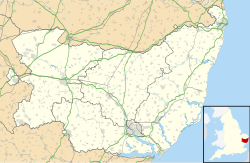| Letheringham | |
|---|---|
 St Mary's Church, Letheringham | |
Location within Suffolk | |
| Area | 9.52 km2 (3.68 sq mi) inc the parish of Hoo, Suffolk |
| Population | 160 (2011) inc the parish of Hoo, Suffolk |
| • Density | 17/km2 (44/sq mi) |
| District | |
| Shire county | |
| Region | |
| Country | England |
| Sovereign state | United Kingdom |
| Post town | Woodbridge |
| Postcode district | IP13 |
| Police | Suffolk |
| Fire | Suffolk |
| Ambulance | East of England |
| UK Parliament | |

Letheringham is a sparsely populated civil parish in the East Suffolk district (formerly Deben Rural District and then Suffolk Coastal) in Suffolk, England, on the Deben River. [1]
Contents
St Mary is a tiny church, the remains of the tower and nave of a Priory church, and sits in a farmyard.
For over 1000 years Letheringham has been a parish of ancient Loes Hundred.
From the 2011 Census population details were no longer maintained for this parish and were included in the civil parish of Hoo.
